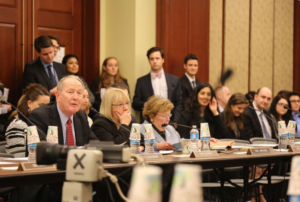
U.S. Sen. Lamar Alexander, R-Tenn., chairs hearings on a rewrite of No Child Left Behind.
It's common for interest groups to play on both sides of the political aisle, even if they tend to lean in one direction. But when it comes to recognizing its champions in public life, the nation's largest teachers union has a long history of favoring Democrats.
That's why it's noteworthy that, this month, the National Education Association bestowed its highest honor, the "Friend of Education Award," on Republican Sen. Lamar Alexander, R-Tenn.
For the NEA, this was a break from the recent past. Education Week reported Alexander is the first Republican to receive the award in more than 30 years. The last was Robert T. Stafford, a Vermont Senator whose policy preferences were notably to the left of today's GOP. Past honorees have included Jimmy Carter, George McGovern and both Bill and Hillary Clinton, as well as writers Diane Ravitch and Jonathan Kozol.
Alexander, a former U.S. Education Secretary and a longtime supporter of educational choice, shared this year's award with Sen. Patty Murray, D-WA. (who also received the honor in 2013), for their role in crafting and passing the largest overhaul of federal school accountability policy since No Child Left Behind.
The new law, the Every Student Succeeds Act, has gotten attention for shifting power over education policy away from the federal government and back to the state and local level. It was backed by an alliance between conservatives like Alexander, who favor local control, and traditional public education players like the NEA and the National School Boards Association.
Why were left-leaning labor groups able to align with both their own management and congressional conservatives to back the new law? The reasons boil down to who has power over public education. Congressman Rodney Davis, R-Ill., who visited an NEA reception at last week's Republican National Convention, offered a concise explanation. (more…)
 Arizona: David Garcia, a Democrat and candidate for the open State Superintendent of Public Instruction seat, opposes private school choice so long as public schools are not "fully funded." Garcia says he is a supporter of public charter schools (Eastern Arizona Courier).
Arizona: David Garcia, a Democrat and candidate for the open State Superintendent of Public Instruction seat, opposes private school choice so long as public schools are not "fully funded." Garcia says he is a supporter of public charter schools (Eastern Arizona Courier).
California: Rocketship charter schools expand and modify their blended learning model to empower teachers with more flexibility and control of their classroom (Education Next).
Florida: Step Up For Students will issue more than 60,000 scholarships to low-income students this school year, allowing many more parents to send their kids to private schools (Tampa Bay Times, Miami Herald). Meanwhile, school choice champion and education commissioner Tony Bennett resigns amidst a school grading controversy in Indiana (Tampa Bay Times, Miami Herald). Florida school choice supporters are disappointed to see him go ( redefinEd).
Kansas: Georgia State Rep. Alicia Morgan (D-Cobb County), a rising star in school choice and ed reform circles, visits Wichita, Kansas to discuss benefits of school choice (Kansas.com). A Kansas City charter school has been sued because it owes over $10.6 million to creditors, with much of the debt coming from buying, renovating and equipping the school building (Kansas City Star).
Louisiana: The state's new "Course Choice" online program now has more than 1,000 students on the wait list (Education Week). More than 3,000 students enrolled in it (Politico). The Louisiana Department of Education has received more than 8,000 applications to participate in the state school voucher program this fall, up from about 3,000 last year (WAFB 9).
Maine: Gov. Paul LePage says Maine needs more charter schools (Main Public Broadcasting Network) but the state senate president disagrees, saying traditional public schools are underfunded (Boston.com). The governor continues to defend charter schools from critics (Portland Press Herald). (more…)
Mitt Romney’s plan to voucherize (though he doesn’t call it that) Title I and IDEA has considerable merit - but it’s not the only way the federal government could foster school choice and it might not even be the best way.
It’s not a new idea, either. I recall working with Bill Bennett on such a plan - which Ronald Reagan then proposed to a heedless Congress - a quarter century ago.
It had merit then and has even more today. As America nears the half-century mark with Title I, we can fairly conclude that pumping all this money into districts to boost the budgets of schools serving disadvantaged kids hasn't done those kids much good, though it has surely been welcomed by revenue-hungry districts (and states). Evaluation after evaluation of Title I has shown that iconic program to have little or no positive impact, and everybody knows that the No Child Left Behind edition of Title I hasn't done much good either. It has, however, yielded an enormous number of schools that we now know, without doubt, are doing a miserable job, particularly with disadvantaged kids, but we're having a dreadful time "turning around" those schools. One may fairly conclude that Title I in its present form isn't working and probably cannot.
So why not try strapping the money to the backs of needy kids and letting them take it to the schools of their choice? This would help them escape from dreadful schools. It would make them more "affordable" for the schools they move into. It would remove one of the main barriers (the non-portability of federal dollars) that discourages states and districts from moving toward "weighted student funding" with their own money. And it would certainly go a long way to change the balance of power in American education from producers to consumers.
Having said that, a word of caution is needed. Few federal education initiatives work nearly as well as intended. (NCLB is again a large, recent, case in point.) Legitimate questions persist about what, exactly, is the federal role in the K-12 sphere, particularly in reforming it. A good case can be made for Washington to generate sound data, safeguard civil rights, support research, and assist with the costs of educating high-risk kids - but setting the ground rules for schools and operating the system is really the job of states. Moreover, the federal share of the school dollar - a dime - isn’t big enough to yield much leverage over how the system works. That’s why the Romney plan is apt to do some good in states (and districts) that want to extend more school choices to their students - the federal dime can join the state/local 90 cents in the kid’s backpack - but won’t make much difference in places that aren’t willing to put their own resources into this kind of reform.
Similar caveats must be attached to other possible methods by which Uncle Sam could try to foster school choice. Which isn’t to say such possibilities don’t exist. Indeed, I can think of four more opportunities. (more…)